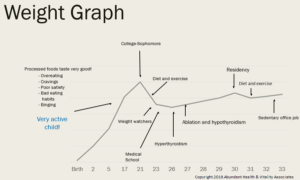Always consult a physician before starting any fitness or nutrition programs. Be sure to tell your doctor about new weight loss programs, medications, herbs, supplements, or online products that you are taking.
So, you’ve decided that it is time to start a weight loss journey and before exercising or making dramatic dietary changes you want to talk to your doctor. If you are like most patients, you may be a little nervous about discussing your weight. This is normal.
We hope that after reading this article you will feel more confident about discussing your weight with a medical professional.
Bariatricians are weight loss doctor who specialize in weight management
Many patients are unaware that doctors exist who specialize in obesity, nutrition and weight management. A bariatrician or medical weight loss doctor (also called an obesity specialist) is a medical doctor experienced in non-surgical weight loss methods. These doctors have completed medical school, a residency program, and board certification in a primary medical discipline such as Internal Medicine or Family Medicine and have also completed additional certification in Obesity Medicine. Speaking with a professional who understands weight management makes the discussion much easier. Patients can visit a bariatrician through a referral from a doctor such as a Primary Care Doctor or by calling the clinic directly to schedule an appointment. Bariatricians tend to be less judgmental regarding weight and open to various treatment modalities such as FDA approved weight loss medications, meal replacement programs, nutrition, and exercise plans. In addition to weight management, bariatricians also diagnose and treat co-morbidities related to excess weight such as diabetes, high blood pressure, and sleep apnea.
Schedule an appointment with Dr Covington
Be Prepared
Most individuals seeking to discuss weight with a medical professional will begin with their personal doctor or a Primary Care Provider (PCP). The more organized you are for this visit, the better. It is important to maximize the appointment time and ensure that all of your concerns are organized so that they can be easily addressed.
Start by reflecting on your weight history
- When did you start gaining weight?
- What events in your life have affected your current weight?
- Have you successfully lost weight in the past and if so, how?
A Weight History Chart is a great tool to help prepare for this discussion (download a free copy of our weight history chart). Providing your PCP with a weight history chart serves as a powerful visual that quickly provides a summary of trends in your weight.
How to complete the weight history chart.
Step 1:
On the bottom line or x-axis add your age (use increments that work for you). For example, if you are 50 years old you may want to apply your age in increments of 10. On the other hand, if you did not gain weight until adulthood you may want to skip from 0 to 20 or the age where weight gain began.
Step 2:
On the vertical or y axis plot your weight, again use increments that work for you.
Step 3:
Chart your weight and identify important life events that impacted your weight.
Be Honest
In addition to your weight history, be prepared to discuss what you eat and drink along with physical activity. If you don’t eat healthy this is the time to be honest with yourself and your doctor. Nutrition is paramount to weight loss so knowing exactly what you eat is necessary, don’t rely on memory, write it down. Prior to the doctor’s visit use an electronic food diary like MyfitnessPal or a paper food diary.
As you reflect on your food intake be prepared to discuss your weaknesses. Do you overeat? Do you have cravings or food triggers? Do you eat healthy throughout the week just to blow it all on the weekend? Eating habits are essential and will help provide insight for your doctor to make recommendations to facilitate weight loss.
Be clear when discussing your concerns with the doctor
The Primary C are Doctor will evaluate weight, Body Mass Index (BMI), medical history, medications, and bloodwork while providing a preliminary plan for weight loss. The PCP is a great place to start since this doctor knows you best. When approaching your PCP be open and honest and clearly state your needs. Do you desire weight loss, nutrition education, accountability, a weight loss referral to a specialist, or simply a discussion about your concerns? If you are uncomfortable discussing your weight with your primary doctor either find a doctor that you are comfortable with or let your guard down so that you can receive the help that you need.
are Doctor will evaluate weight, Body Mass Index (BMI), medical history, medications, and bloodwork while providing a preliminary plan for weight loss. The PCP is a great place to start since this doctor knows you best. When approaching your PCP be open and honest and clearly state your needs. Do you desire weight loss, nutrition education, accountability, a weight loss referral to a specialist, or simply a discussion about your concerns? If you are uncomfortable discussing your weight with your primary doctor either find a doctor that you are comfortable with or let your guard down so that you can receive the help that you need.
Be Open to Weight Loss Referrals
Your Primary Care Doctor may refer you to additional specialists in order to maximize the time, tools, and resources needed for weight management, counseling, nutrition, exercise, and accountability. These professionals are intended to enhance your weight loss success.
#1 Dietician:
A registered dietician (RD) is a professional who provides food recommendations, nutrient intake, grocery lists, meal plans, and even recipes to help with healthy eating. Dieticians are great accountability partners and will focus on structuring the eating plan and routine.
#2 Bariatrician
A bariatrician is a doctor who specializes in weight loss. These doctors provide nutrition along with a comprehensive treatment plan for weight management. In addition to structuring food intake they may also provide advanced nutrition testing such as food sensitivities or comprehensive nutrition labs for nutrient deficiencies. Bariatricians measure body fat, body composition, may order labs, EKGs, or other studies in order to diagnose or treat conditions related to excess weight. Bariatricians may also prescribe FDA approved weight loss medications to aid in weight loss.
#3 Psychiatrist and Psychologist
The bariatric doctor may request that a psychologist or psychiatrist work with a patient regarding certain behaviors, emotions, or psychiatric conditions related to weight. Psychiatrists are consulted to work with weight loss patients regarding eating disorders such as binge eating, bulimia or body image disorders such as body dysmorphia. A psychiatrist will also be consulted to treat severe depression and anxiety or to clear a patient for bariatric surgery, if applicable. A psychologist or counselor may be asked to provide intense counseling for weight loss behaviors, habits, trauma, and emotions.
#4 Bariatric Surgeon
A bariatric surgeon specializes in weight loss surgery techniques ranging from lap band, vertical sleeve gastrectomy, to gastric bypass. The bariatrician may refer a patient to a bariatric surgeon if they need more intense intervention beyond medical weight loss. In addition, a bariatrician often starts the required medical weight management process to qualify for surgery by most insurance programs.
#5 Gastroenterologist
Gastroenterologists and bariatric surgeons both perform the weight loss balloon system or Orbera procedure. A gastroenterologist may be consulted by your bariatric doctor to provide this weight loss method if it is considered to be suitable for you.
#6 Plastic Surgeon
A plastic surgeon can be helpful if the issue is related to cosmesis such as loose skin or diastasis recti or excess tissue needing reduction or augmentation such as a breast reduction. Your bariatric or primary care doctor may refer you to a plastic surgeon for cosmetic surgery in this case.
#7 Physical Therapist or Exercise Physiologist:
A bariatric doctor may refer a patient to a physical therapist or exercise physiologist for education, fitness assessment, and weight loss routines. A physical therapist is often preferred over a fitness trainer for patients who have severe obesity, osteoporosis or joint pain, or certain medical conditions that require professional modifications.
#8 Massage Therapist
A massage therapist is a great adjunct for soothing tight muscles and improving circulation and flexibility. A bariatric doctor may refer a patient to a massage therapist for muscle pain related to physical activity. Massage therapy is great for improving tension related headaches.
Treating your weight may cure other medical problems
Often excess weight is the underlying cause of other medical conditions and chronic diseases. Weight loss provides several health benefits including less fat around visceral organs, less inflammation, improved oxygenation and blood circulation. For these reasons weight loss improves the following medical conditions:
- Diabetes
- High Blood Pressure
- Reflux Disease
- Sleep Apnea
- Polycystic Ovarian Disease (PCOS) and Infertility
- Joint pain and osteoporosis
- Chronic Pain
- Autoimmune Diseases
Be Aggressive
Obesity is related to the top causes of death in the United States, therefore, it is not to be taken lightly. Obesity increases the risks of heart disease, stroke, and certain cancers such as breast and colon cancer. The longer individuals carry excess weight the harder it becomes to lose weight due to brain and hormonal changes.
It is imperative that you become aggressive regarding your weight loss efforts. Although a BMI over 30 is categorized as obese, it is recommended to seek professional weight management for a BMI over 25 (overweight category). Patients who have rapidly gained weight for unknown reasons should also consult a doctor. Patients with more than 15 pounds to lose, more than 1 medical condition, or more than 1 medication are recommended to consult a doctor for weight loss.
If you would like to visit
Abundant Health & Vitality Associates for medical weight loss
Please call 704-997-9661 to schedule a new patient appointment
Medical insurance is not required or accepted (all patients receive super bills for insurance reimbursement)
We accept cash, credit, HSA, FSA, and Care Credit for payment




